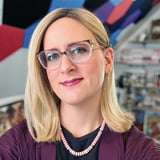Summary
Science orgs typically lack designers and for good reason; there is no product. The focus is on data. The currency is discovery. Why spend money on a designer when we need to buy a new microscope? So how do we create a better experience through design for science? In this talk, Mark will outline his approach to operationalizing design in science orgs, first in CERN and now at the European Molecular Biology Laboratory.
Key Insights
-
•
Scientific organizations like CERN and EMBL prioritize publishing and discovery over commercial success, reshaping design's role and value.
-
•
In science-driven cultures, 'designers' broadly include many digital tool creators not formally recognized as designers.
-
•
Bottom-up governance without top-down mandates leads to a heavily siloed, decentralized environment challenging for design ops.
-
•
Incremental marginal gains, a concept from elite sports, can drive meaningful improvements in complex scientific organizations.
-
•
Adapting to organizational culture and existing communication rituals, such as scientific poster sessions, improves design uptake.
-
•
Debate and scrutiny embedded in science happen mainly through committees, which design ops should engage, not avoid.
-
•
Persistent, repeated communication is a major part of design leadership in environments resistant to change.
-
•
Titles and language matter: calling user researchers 'researchers' risks confusing roles with scientists.
-
•
A culture fixated on science over design means entrenched status quos protect research group autonomy and can resist change.
-
•
Design ops success in science relies on cross-organizational presence and sponsorship from leadership focused on enabling science.
Notable Quotes
"There are thousands of people making digital things every day, but we don’t call them designers."
"Success here isn’t shipping products, it’s delivering great science and publishing."
"The organization is bottom-up; there are no top-down yearly objectives we have to meet."
"If you reframe who you think a designer is, our design team overnight became about 500 people."
"It’s the aggregation of marginal gains, tiny changes across a system that add up to something big."
"All fixed set patterns are incapable of adaptability and pliability. The truth lies outside of fixed patterns."
"90% of my job is saying the same thing over and over and over again."
"Calling user researchers ‘researchers’ sets them up for failure because scientists already own that title."
"Committees are the mechanism for debate and scrutiny in science, so I’ve chosen to engage with them."
"We have to work with the organization culture, not against it, and see what sticks."
Or choose a question:
















More Videos
"Design needs to balance business strategy and technology limitations but always keep users centered."
Product and Design at Bloomberg: A 15-year Evolution
December 6, 2022

"No tracking is perfect because numbers tell you what likely happened, but not why it happened."
Erin WeigelUX Lessons from running more than 1,200 A/B Tests
July 10, 2024

"Scaling is not for the sake of scaling, but scaling over time."
Jacqui Frey Dan WillisPanel Discussion: Integrating DesignOps
November 7, 2018

"IBM’s sustainability journey has ebbs and flows, impacted by executive pivots, acquisitions like Envizi, and market pressures."
Chris HammondEmbedding sustainability into enterprise design and development: A journey towards "sustainability consciousness"
April 2, 2025

"If we think about training AI on the average, then what we will get is more of the same."
Samuel ProulxFrom Standards to Innovation: Why Inclusive Design Wins
September 10, 2025

"There’s no one-size-fits-all approach; budgets and needs vary widely across researchers and organizations."
JP Allen Carrie Boyd Malcolm EvansNavigating the UX Tool Landscape
March 11, 2021

"Staff and principal designers need to balance zooming in on execution and zooming out to define strategic vision and minimize risk."
Catt Small Micah Bennett Brian Carr Jessica HarlleeWhat's Next for ICs: Exploring Staff and Principal Designer Roles
February 22, 2024

"There are 8 billion creative humans on planet Earth, far beyond the number of trained designers."
Surya VankaUnleashing Swarm Creativity to Solve Enterprise Challenges
June 10, 2021

"Self-identifying with a disability can humanize accessibility issues beyond checklists and code requirements."
Sam ProulxMobile Accessibility: Why Moving Accessibility Beyond the Desktop is Critical in a Mobile-first World
March 10, 2022
















